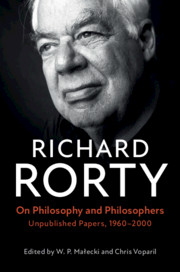Book contents
- On Philosophy and Philosophers
- On Philosophy and Philosophers
- Copyright page
- Contents
- Acknowledgments
- Note on Sources
- Introduction: Rorty as a Critical Philosopher
- I Early Papers
- II Later Papers
- 9 Philosophy as Epistemology: Reply to Hacking and Kim
- 10 Naturalized Epistemology and Norms: Replies to Goldman and Fodor
- 11 The Objectivity of Values
- 12 What Is Dead in Plato
- 13 The Current State of Philosophy in the United States
- 14 Brandom’s Conversationalism: Davidson and Making It Explicit
- 15 Bald Naturalism and McDowell’s Hylomorphism
- 16 Reductionist vs. Neo-Wittgensteinian Semantics
- 17 Remarks on Nishida and Nishitani
- Index of Names
12 - What Is Dead in Plato
from II - Later Papers
Published online by Cambridge University Press: 10 October 2020
- On Philosophy and Philosophers
- On Philosophy and Philosophers
- Copyright page
- Contents
- Acknowledgments
- Note on Sources
- Introduction: Rorty as a Critical Philosopher
- I Early Papers
- II Later Papers
- 9 Philosophy as Epistemology: Reply to Hacking and Kim
- 10 Naturalized Epistemology and Norms: Replies to Goldman and Fodor
- 11 The Objectivity of Values
- 12 What Is Dead in Plato
- 13 The Current State of Philosophy in the United States
- 14 Brandom’s Conversationalism: Davidson and Making It Explicit
- 15 Bald Naturalism and McDowell’s Hylomorphism
- 16 Reductionist vs. Neo-Wittgensteinian Semantics
- 17 Remarks on Nishida and Nishitani
- Index of Names
Summary
“The Objectivity of Values” assesses Plato’s contributions to Western philosophy and culture. It posits that among the most lasting of those contributions are the idea of the world of absolute truth beyond time and chance, and the idea that unless such a world exists there is no way to answer Socrates’s questions. But then it posits that these ideas should be abandoned. Recognizing that there are no knock-down philosophical arguments against them, it resorts to the historical argument that they have done more harm than good. Finally, the paper proposes that a good alternative to those ideas may be found in John Dewey’s view that the point of Socratic questioning is not to arrive at absolute truths but to keep the conversation of humanity going.
- Type
- Chapter
- Information
- On Philosophy and PhilosophersUnpublished Papers, 1960–2000, pp. 191 - 194Publisher: Cambridge University PressPrint publication year: 2020

